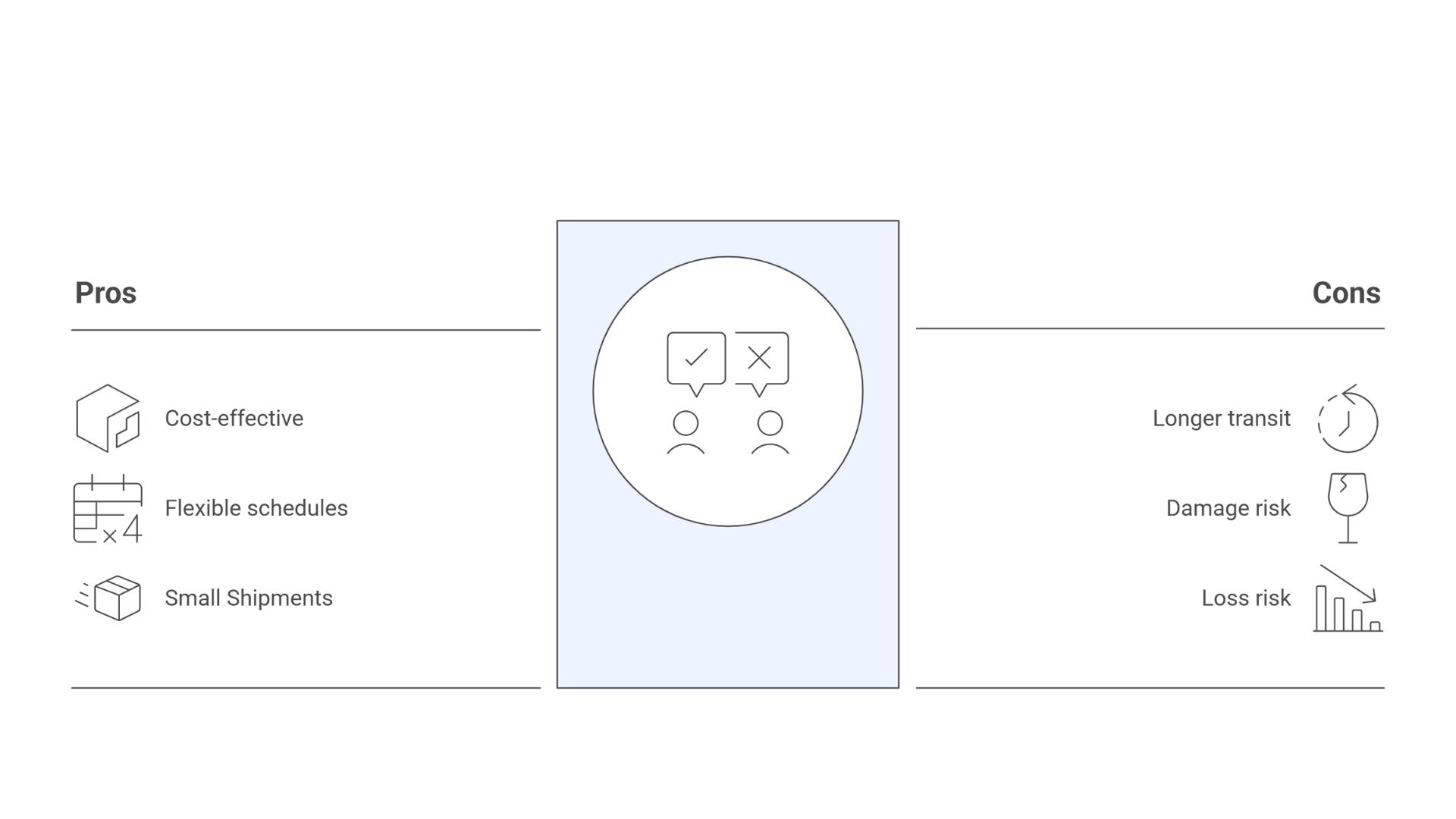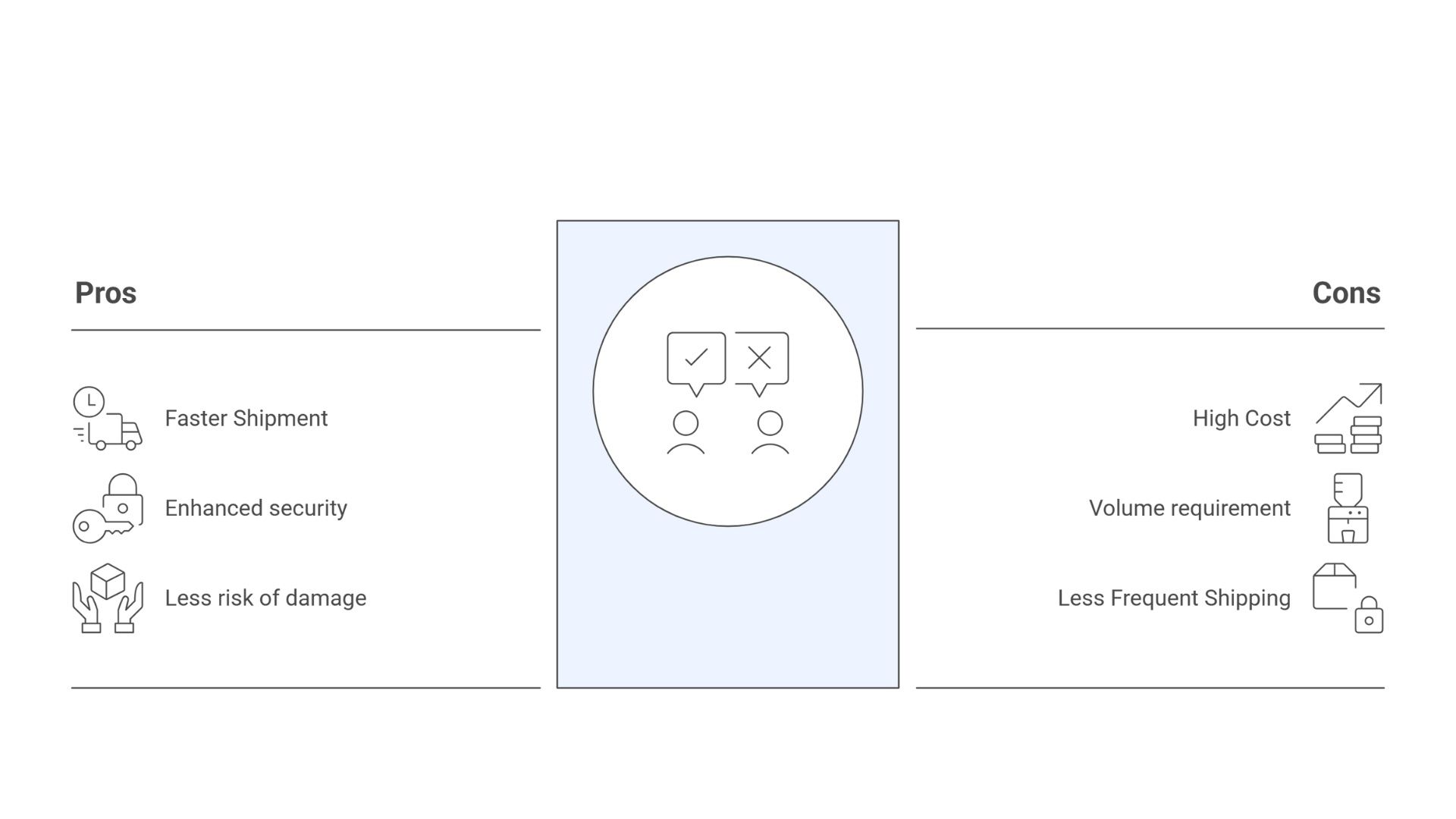
FCL and LCL Shipments: Key Differences, Cost Factors, and What is Best for You
August 29, 2025
AAJ Swift

Shipping internationally? If yes, then you have to make a choice that'll impact cost, speed, and security. This can be either Full Container Load (FCL) or Less Than Container Load (LCL).
FCL means you rent a whole container for your goods, while LCL allows you to share container space with other companies, and you only pay for the space you use.
But for choosing which shipment model is best for you, you have to look for metrics such as cargo volume, budget, deadlines, and what exactly you're shipping. FCL and LCL shipments each have their own advantages and disadvantages. So, let's talk in detail.
What Is LCL Shipment?
LCL stands for Less-than-Container Load. This is where several businesses share one container.
You pay only for the space your goods take up, measured in cubic meters (CBM). LCL shipping is an efficient and cost-effective way to ship your goods.
How does LCL work? Two main things that are in the LCL process:
- Consolidation: Pack multiple shipments together into a single container at the origin port.
- Unpacking & Shipment: At the destination port, unpacking is performed, followed by the LTL shipping of separate goods to the final hub or warehouse.
What Is FCL Shipment?
FCL stands for Full Container Load. You book a whole shipping container just for your goods—no sharing.
You pay a flat rate for the exclusive use, even if your cargo doesn't fill the entire space. It will be costlier compared to LCL shipping.
How FCL Works? With the FCL model, you load the container at the origin, seal it, and it remains sealed until it reaches its destination. No one else's stuff gets mixed in.
You control loading and unloading. That means more savings in terms of timing and how your goods are handled.
Container Sizes Available
FCL usually uses these standard sizes:
- 20-foot container: Holds about 28-30 cubic meters (CBM)
- 40-foot container: Holds about 56-58 CBM
- 40-foot high cube: Holds about 68-70 CBM
FCL vs LCL Shipments
The following are the main differences between FCL and LCL shipments:
Advantages And Disadvantages Of LCL Shipments

A. Advantages of LCL Shipping
- Cost Benefits for Small Shipments: LCL shipping is great when you don't have enough cargo to fill a container. You only pay for what you use, so it's affordable for part load transport.
- Flexible Shipping: You don't have to rely on filling the whole container; you can ship more often. That helps keep inventory moving and, honestly, just makes life easier.
- Low Storage Requirement: You can send smaller batches without needing to store tons of stuff, which cuts down on storage costs.
B. Disadvantages of LCL Shipping
- Higher Per-Unit Costs: LCL does cost you more per unit than FCL because of extra steps such as consolidation and extra handling, which all add up, resulting in a higher total price.
- Longer Transit Times: Because of extra steps, your goods first get consolidated with others and then unpacked at the destination. This increases delivery time.
- Increased Risk of Damage: LCL cargo gets handled more—loaded, unloaded, sorted. This simply means there is a higher chance of damage or loss.
- Less Security Control: You have less control over your goods, and security can be an issue, especially if you're dealing with high-value shipments.
Advantages And Disadvantages Of FCL Shipments

A. Advantages of FCL Shipping:
- Faster Shipment: FCL gets your goods there faster. You get direct routing, with no waiting for other shipments to be sorted.
- Security and privacy are a big plus, as only your cargo is in a container with a seal. Also, it's up to you how you pack your shipments.
- Lower per-unit shipping cost: With large shipments, the per-unit shipping cost drops.
- Less risk of damage: Less handling means your cargo is much safer and decreases any risk during handling in between, such as that of LCL shipments.
B. Disadvantages of FCL Shipping:
- Higher Upfront Costs: Paying for a full container isn't cheap, so it is really not an option for smaller businesses.
- Space Optimization: If you don't have enough cargo, then you end up wasting money and space.
- Less Frequent Shipping: As the majority of businesses wait till full container loads, this also simply means less frequent shipments.
Cost Factors: LCL vs FCL
FCL pricing is straightforward: you pay for the entire container, no matter how much space you use. For large shipments, FCL usually wins on cost per unit. The more you ship, the lower your cost per cubic meter or kilogram.
LCL costs depend on the space your cargo takes up. You pay for your share of the container, nothing more.
Smaller shipments? LCL is usually cheaper. Why pay for a whole container if you're only using a corner of it?
Additional LCL fees can add up for you:
- Consolidation charges at origin
- Deconsolidation fees at the destination
- Warehouse handling costs
- Documentation fees
FCL has fewer extra charges. The container goes straight from you to the receiver, so there's less handling and fewer surprise fees.
Note: Don't just look at base shipping rates—add up all the fees, handling charges, and possible delays. That's what really affects your delivery.
When Should Businesses Choose LCL Shipments?
LCL is perfect for businesses with smaller loads. You'll see companies choose this when shipping:
- Less than 15 cubic meters of cargo
- 2-3 pallets or fewer
- Irregular shipment volumes
- Shipment isn't urgent
- Care more about cost than speed
When Should Businesses Choose FCL Shipments?
FCL is best for shipments over 15 cubic meters or if you have a high-value, fragile, large-sized cargo (furniture).
Shipping large volumes regularly? FCL is usually cheaper per unit. Plus, since you're not sharing, your goods get there faster—no waiting for others' cargo to be loaded or unloaded.
Thus, choosing between FCL and LCL shipping significantly affects the amount of profit you save on your shipments, particularly when considering a desirable delivery time.

